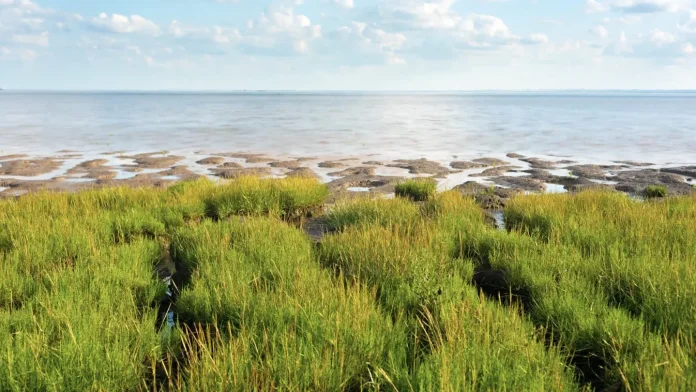As part of its environmental work surrounding its offshore wind farms, Ørsted is partnering with Lincolnshire Wildlife Trust and Yorkshire Wildlife Trust to help restore the biodiversity around the Humber, a large tidal estuary on the east coast of northern England.
The flagship project will invest more than GBP 2.5 million to restore parts of the Humber through the planting of three hectares of salt marsh and four hectares of seagrass, and the creation of a biogenic reef through the introduction of half a million native oysters. It will build on a program of seagrass restoration work already underway between Ørsted ’s Hornsea 4 project and Yorkshire Wildlife Trust.
Climate change is becoming one of the biggest drivers of biodiversity loss, and a substantial expansion of renewable energy is central to tackling these interlinked crises. The U.K. government has set an ambition to build 50 GW of offshore wind by 2030, and Ørsted believes that the expansion of offshore wind energy needed to fight climate change can and must integrate solutions that support and enhance biodiversity. That is why Ørsted has set an ambition to deliver a net-positive impact on biodiversity across all the new energy projects it commissions from 2030 at the latest.
“Recent events have demonstrated the importance of developing a home-grown renewable energy supply,” says U.K. Environment Minister Rebecca Pow. The U.K. Department for Environment, Food & Rural Affairs (DEFRA) has commended this new pilot project as an example of how restoration of important marine habitats can work in practice and deliver multiple benefits. “We’re committed to developing schemes that work alongside the recovery of natural habitats. Climate change and biodiversity loss are significant challenges, and I welcome the commitment Ørsted is making today.”
“This project in the Humber Estuary showcases the potential for private sector investment, alongside support from the public sector,” Pow adds. “I hope that this is a catalyst for further practical projects that protect and enhance our natural environment.”
The Humber Estuary’s conservation status has recently been downgraded due to pollution and loss of habitat, and salt marshes are disappearing at an alarming rate due to rising sea levels and land development across the U.K. encroaching on coastal areas. Rewilding and reintroducing native species will help restore the estuary and play a vital role in addressing climate change.
“Now’s the time for action on biodiversity,” comments Benj Sykes, head of environment, consents and external affairs at Ørsted UK. “We know that the climate crisis is one of the biggest threats to our biodiversity, and so we must start to implement tangible projects that will help restore nature. As a company that’s committed to building a clean, sustainable future for people and the planet, we know that we need to work harder than ever to ensure we continue to develop in balance with nature as offshore wind becomes the backbone of the energy system in the U.K.”
During the first phase of the project, seagrass seeds will be planted in four hectares of the estuary to provide vital shelter and a nursery ground for a variety of fish. The release of 500,000 native oysters will enable biogenic reefs to form, in turn providing critical habitat for multiple species while also filtering and improving estuary water quality. Nearly all of the native oyster reefs have disappeared from the Humber since the early 1900s, and this project will start to rebalance biodiversity in the area. Through this project, Ørsted has also committed to planting and restoring three hectares of salt marsh plants, providing nutrient rich habitats ideal for wading birds. The habitats created by these three vital species will nourish and protect the native wildlife of the Humber.
“Large-scale restoration of Yorkshire’s seas is the only way forward if we are to tackle the twin nature and climate crises,” states Rachael Bice, CEO for Yorkshire Wildlife Trust. “Through this collaboration with Ørsted, we’ll make a transformative step in reversing decades of damage to the ecosystems of the Humber Estuary. Benefitting nature, climate and people by providing essential habitat, increasing carbon sequestration and supporting local fisheries, this project sets the standard for marine restoration, and we look forward to it driving further investment in projects across Yorkshire and the U.K. We can’t wait to share the results in the coming years.”
“After spending time over recent years working with partners across the Humber to identify priorities for the estuary and its hinterlands, Lincolnshire Wildlife Trust is extremely pleased to take forward this work with Ørsted and Yorkshire Wildlife Trust,” says Paul Learoyd, Lincolnshire Wildlife Trust’s CEO. “The lessons from this work could see large-scale restoration across our North Sea, and beyond. These are exciting times that build on the foundations of all the work that partners have contributed.”
The Humber pilot is one of a number of innovative projects that Ørsted is exploring to protect and enhance biodiversity. Ørsted is also working alongside WWF Denmark to improve the conditions for cod and other marine organisms in the Kattegat strait between Denmark and Sweden, and together with ARK Nature it is pioneering marine rewilding in the North Sea. The company also recently announced ReCoral by Ørsted, an attempt at supporting coral reefs by growing corals on offshore wind turbine foundations in Taiwan.




